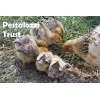Meetings between homeschoolers & government
Statement of Pestalozzi Trust on Roundtable Discussion Meeting with the DBE on the Home Education Policy 28 February 2020
Highlights
- The Pestalozzi Trust attends the Roundtable on the implementation of the Home Education Policy and hands over Memorandum of members’ concerns and questions.
- Tone of meeting was positive and constructive.
- Minister says “best interests of the child” paramount, shows flexibility on jailing and questions if home visits are effective.
- Home education movement and DBE need to examine areas of agreement and difference and work to find solutions that accord with the Constitution as a fundamental bottom-line.
- The Pestalozzi Trust looks forward to on-going engagement with increased parental, alumni and child involvement.
A step forward in the long walk to freedom for home educators
Karin van Oostrum representing the Pestalozzi Trust participated in the Roundtable on Home Education on Friday 28th February 2020, arranged by the Department of Basic Education.
The Trust wishes to thank the home educating parents, associations, curriculum providers and other organizations who joined us in attending the meeting. Many travelled significant distances to be present.
But, above all we wish to thank our loyal members who make it possible for us to attend these meetings.
Minister Motshekga delivers the keynote address
The Deputy Minister led the discussions. The Minister in her keynote address emphasised that we should be working together to serve the “best interests of the child” and that during our deliberations we should keep that in mind. She also mentioned that she felt that home education had a positive contribution to make to the education sector as a whole. The Minister encouraged robust debate and robust debate was had.
Minister Motshekga showed her flexible approach and is willing to re-examine a number of issues. Among these were the appropriateness of applying the penalty provisions of the South African Schools Act to home educators as well as the need for home visits. Both these issues had been raised in the Senior Counsel opinion the Trust previously shared with the Minister and her legal team.
In respect of home visits, a number of officials stated that they always made appointments and explained the reason for the visit. This was challenged by home educators who mentioned the practice of families being told that officials would be in a certain area for a particular period and that officials would visit them within that time frame. DBE and provincial education department officials stated that this should not be happening and asked to be informed when this takes place. We request our members to please inform the Trust if this occurs.
However, the Minister also spoke about “bottom-lines”. The Department has not spelt out clearly and officially what their “bottom-lines” are. But we feel that their attitudes around assessment and curricula are not as flexible as on other points.
The bottom-lines for the Trust are, however, clear. They are the best interests of our member families, and the Constitution.
Representation in the Commissions
Following speeches, unfortunately no time had been allocated to the home education movement to address the Roundtable, and participants formed working groups called “commissions” to look at various aspects of home education regulation. The home education movement had not been consulted on the topics and procedures of the commissions; so many of the important issues raised overlapped and were dealt with less effectively than they could have been.
Members of the home education movement were well represented in these groups and the majority of those delegated to provide report-backs to the full group were from the home education movement. The purpose of these groups were broadly to examine how the DBE and the home education movement could find common ground and to assist the DBE in understanding their weaknesses. The purpose of these group meetings was not to negotiate with the Department but more of brainstorming session that could propose new ideas and new paths for engagement.
Registration
The Department is eager to encourage registration, but home educators pointed out that this was a problematic issue for many for a number of principled and practical reasons.
Home educators made it clear that on principled grounds they objected to the concept of seeking permission to perform a duty. Reference was made to the 2014/2015 discussions in which the South African Coalition for Home Education raised the possibility of a process of notification rather than registration.
Many practical problems such as the conflict between the registration requirements in the Policy and the law, especially the provincial regulation in KZN and the North-West (the only two provinces with regulations) were raised. A positive development was that in the general discussion afterwards a willingness was expressed to bring these regulations in line with the Policy on Home Education. While not ideal, this is a step forward.
A memorandum setting out the concerns and questions of Trust members was handed to the DBE and presented to the Chairpersons of a number of commissions.
“Long walk to freedom”
Dr Moses Simelane (DBE) closed the meeting by referring to the ex-President Mandela’s “Long Walk to Freedom”, using this as an analogy for the long walk the Department and the home education movement had embarked upon since 2014/2015. He also mentioned how we would encounter hurdles along the way and that after we had crossed those hurdles we would find new hurdles. We hope one day to find the freedom to educate our children in a manner that is in their best interests.
Those who were present at the 2014/2015 meeting felt that the DBE had a much more positive approach to home education. The DBE is eager to create working groups to take these discussions forward. The home education movement made it clear that meetings like these and future meetings must involve a broad cross section of all parents, alumni and children who choose to participate.
In summary, the Roundtable was positive, but as usual the Trust adopts a cautious and conservative approach and we remain vigilant. We want to see positive intensions turned into positive actions.
PS: One little hurdle was Mr. Elijah Mhlanga, spokesperson for the DBE, who attempted at the close of one commission to obtain the agreement of all that we would support registration. Mr. Mhlanga who is a communication person, with a poor grasp of the technicalities, was politely ignored and no verbal agreement or indication of support for his outburst was asked for by the Chairperson. Mr. Mhlanga, however, saw fit to tweet that “we” (meaning all present at the Roundtable) had agreed to registration. This was of course not the case.
Legal & Research
Centres
Homeschool ABC
Support
Curriculums
GED through Learnalot - Grade 12 ...
Why enrol with Learnalot? With Learnalot, you have the flexibility ...
Sunrise readers: From pre-reading ...
Parents and educators - these popular reading books with an ...
Learn, code and create with Ubbu
Introducing ubbu!An Adventure of Code and Play! Learn, Code ...
Has no content to show!
































